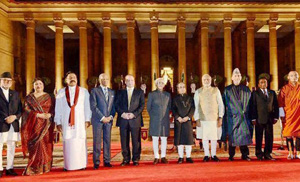Kathmandu, Nov 26: Pakistan today stalled the inking of SAARC connectivity agreements, including motor vehicle pact, saying it was yet to complete its "internal process", notwithstanding other countries, including India and Sri Lanka, who have been strongly pitching for strengthening the people-to-people contact and movement of goods in the region.
While Pakistan's blocking has created "disappointment" among the Indian side, which had initiated these proposals, sources maintain that India has already initiated bilateral connectivity pacts with countries within SAARC and yesterday's Motor Vehicle Agreement with Nepal was an example of that.
Stressing the need for better connectivity in the region, Prime Minister Narendra Modi, in his speech at the 18th SAARC Summit said, "Our relations become stronger when we connect the lives of the ordinary citizens of our countries. That is why connectivity and services by rail and road are so important. We should also connect ourselves more by air."
He further said that, "for India, our vision for the region rests on five pillars – trade, investment, assistance, cooperation in every area, contacts between our people and, all through seamless connectivity."
Sri Lanka President Mahinda Rajapaksa said better connectivity will help economic integration and will boost people-to-people contact in the region.
In her speech at the Summit, Bangladesh Prime Minister Sheikh Hasina said her country was in favour of early signing of the regional motor vehicle and railway agreements and said the pacts will help trade.
On the connectivity pacts, External Affairs Ministry Spokesperson Syed Akbaruddin said these agreements were discussed at various senior levels and there was no objection from any country but one state has indicated that they need approvals of their internal processes. However, he did not divulge the name of the county."
Noting that SAARC works on the consensus which was smart and efficient way of working, Akbaruddin said India hopes some "tangible" outcomes as the eight-member bloc has often being accused of not moving fast.
Ahead of the visit by Prime Minister Modi to attend the summit, the cabinet had cleared the signing and ratifying of the SAARC Motor Vehicles Agreement and SAARC Regional Railways Agreement by India, as a member state of SAARC.





Comments
Add new comment